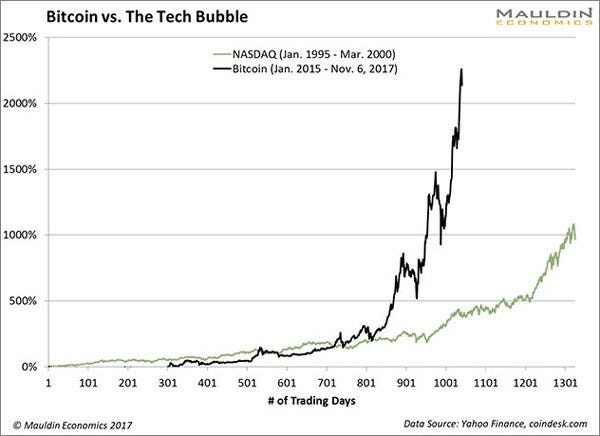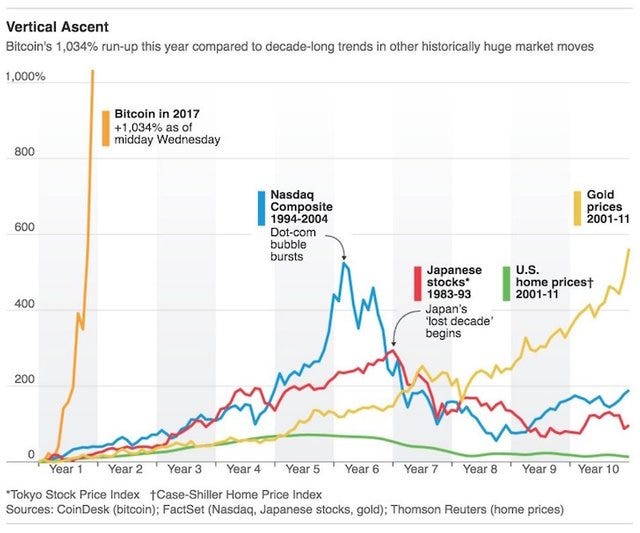Why Some People Still Don’t Get Crypto
Cryptocurrency is literally at the intersection of a lot of contentious topics — history, politics, technology, and money.
Take that in for a second.
In order to understand crypto, you have to throw away your beliefs about money, dive into grasping a totally new technology, and consider the implications of structuring society in a different way. People are going to get pretty heated if there’s something that could potentially shake the foundations on several fronts.
Unless you’re in tech, or you’re an optimist, it’s going to be hard for you to wrap your head around the value proposition. That doesn’t mean you can’t. It’s not rocket science, but it isn’t intuitive. It goes against the grain.
“Science and technology revolutionize our lives, but memory, tradition and myth frame our response.” — Arthur Schlesinger
Technology is hard to understand
When Mark Zuckerberg was on trial he was asked some pretty stupid questions.
The senator asked, “So, how do you sustain a business model in which users don’t pay for your service?”
“Senator, we run ads,” Zuckerberg responded. He couldn’t help but smirk.
The fact that many people (let’s say aged 40 and over) don’t understand the business model of one of the biggest tech companies in the world doesn’t give us much hope.
For some, it’s easy to hear “thermodynamically-guaranteed, peer-to-peer, decentralized, censorship-resistant digital money that is not backed by the government” and turn the other way.
Money is a touchy subject
We’re all generally insecure about money. Next time you meet someone, ask them “how much money do you make?” and look at the expression on their faces.
They preach the benefits of index funds, compounding interest, Roth IRA’s, and becoming a millionaire by saving your hard-earned money for the next 40 years.
The “tried and true way” is starting to reveal some cracks. Entrepreneurs have known this for a long time — the law of asymmetrical gains — but now new currencies are being fashioned out of thin air and it totally boggles people’s minds.
For many, if not all, ego is involved. Those that are wealthy are even more insecure than those who have no money because they’re trying to hold on so dearly to their hard-earned cash.
And many of those same people did get into BTC and lost money (and they’re mad), while others are bitter because they didn’t get involved sooner.
Take Bob, for example. Bob didn’t listen to his friends when they told him about Bitcoin. Now he regrets it.
He’s mad that he wasn’t part of the “bubble.”

And he’s mad that he missed out on the best-performing financial asset in history.

I’m sure there are plenty of people like Bob.
Politics and bad memories
The story we told ourselves for many centuries was one of imperialism. Conquer territory, take resources, and expand.
Imperialism continued on for some time and culminated in WWI. But we realized that it wasn’t worth it anymore — too many lives were lost, and we proclaimed it was the last war we’d fight.
We were wrong. Just a few years later a new ideology was on the block. The story changed to one of fascism, sweeping us into an even bigger bloodbath than we could’ve ever imagined.
Then it was communism’s turn in the global arena. A promise to put the power back in the hands of the people (sound familiar?) After millions of lives lost and being on the brink of nuclear war, it was clear that it didn’t work.
Ultimately, after some close calls liberalism prevailed — the belief that we should enhance the freedom and protect the individual, both from other people and from governments.
Anyone that has any recollection of the 20th century knows the dire cost of inflated ideologies and big promises.
Now crypto comes in and creates money out of thin air. It preaches a libertarian ideal — a left-leaning idea that’s on the spectrum closer to communism — that wants government out of the picture.
This is unfortunate because Satoshi didn’t say that. Nobody really said that.
Also, read – The Rise Of Smart Securities And Private Blockchains
The best use case for crypto is actually to give some power back to people who greatly need it — you know, people in Venezuela and Ukraine and Russia and India and Greece — to protect themselves from actual dictators, actual tangible losses from hyperinflated currencies, and financial corruption.
Like my grandma in Crimea (Ukraine) who can’t receive bank transfers because of the ‘embargo.’
People fear what they don’t understand
When you question how money works and the underpinnings of the economy, it just goes over people’s heads. It’s revolutionary.
Most people haven’t read Satoshi’s white paper. Why? The same reason that people don’t research the details of an article that says “Coconut oil is bad.”
We’re living in a world where our day starts with a deluge of information that is impossible for one person to sort through.
So, instead of digging deep into big claims, we do what we’ve always done. We accept first and verify later. Except we don’t usually verify.
The way that most of us form our views isn’t by doing meticulous research. It’s by hearing something, accepting whether or not it fits into our worldview and identity, and that’s it.
It’s much less time-consuming both emotionally and mentally. It’s much easier to just say “bitcoin is like Tulip Mania.” But deep down you’re scared (but maybe too lazy) to do any more research — to seek out knowledge.
Old people especially don’t get it
It’s partially a generational gap — as we get older, we prefer not to challenge the status quo. And, as I mentioned above, you have to get the tech.
I’ve talked about Warren Buffet in this respect. He’s decried bitcoin, calling it ‘rat poisoned squared,’ and all sorts of other names.
But, he’s been wrong before. He regrets not investing in Google or Facebook. He says, “I was too dumb to realize.”
Most of us can’t explain how an airplane, car, or the internet works. But we use these things all the time. And I’m sure that every time some new invention comes along, old folks are against it. They don’t get it. They say it’s a waste of time and stand on the sidelines, simultaneously fascinated, confused, and bewildered.
That doesn’t mean we shouldn’t heed the advice of those older than us. In fact, we should be very thoughtful about what we’re doing. Technology has no moral underpinnings. We can use a hammer to build, or we can use it to smash someone’s face.
We have to be careful not to repeat the mistakes of the past. But we can’t just stop being interested in something, though. It’s too late for that.
As one blockchain entrepreneur told me, ‘the genie has been let out of the bottle.’
Stay informed with daily updates from Blockchain Magazine on Google News. Click here to follow us and mark as favorite: [Blockchain Magazine on Google News].
Get Blockchain Insights In Inbox
Stay ahead of the curve with expert analysis and market updates.
latest from tech
Disclaimer: Any post shared by a third-party agency are sponsored and Blockchain Magazine has no views on any such posts. The views and opinions expressed in this post are those of the clients and do not necessarily reflect the official policy or position of Blockchain Magazine. The information provided in this post is for informational purposes only and should not be considered as financial, investment, or professional advice. Blockchain Magazine does not endorse or promote any specific products, services, or companies mentioned in this posts. Readers are encouraged to conduct their own research and consult with a qualified professional before making any financial decisions. The featured image used is just a creative depiction of the title and it does not intend to hurt sentiments of any person or institution. If it hurts anyone sentiments, please do not hesitate to reach out to Blockchain Magazine.

 Bitcoin
Bitcoin  Ethereum
Ethereum  XRP
XRP  Tether
Tether  Solana
Solana  Dogecoin
Dogecoin  USDC
USDC  Cardano
Cardano  Lido Staked Ether
Lido Staked Ether  TRON
TRON  Chainlink
Chainlink  Avalanche
Avalanche  Wrapped stETH
Wrapped stETH  Stellar
Stellar  Wrapped Bitcoin
Wrapped Bitcoin  Sui
Sui  Hedera
Hedera  Toncoin
Toncoin  Shiba Inu
Shiba Inu  WETH
WETH  Polkadot
Polkadot  Parkcoin
Parkcoin  LEO Token
LEO Token  Litecoin
Litecoin  Bitget Token
Bitget Token  Bitcoin Cash
Bitcoin Cash  Uniswap
Uniswap  Hyperliquid
Hyperliquid  Official Trump
Official Trump  Wrapped eETH
Wrapped eETH  Pepe
Pepe  USDS
USDS  NEAR Protocol
NEAR Protocol  Ethena USDe
Ethena USDe  Aave
Aave  Aptos
Aptos  Internet Computer
Internet Computer  Ondo
Ondo  Ethereum Classic
Ethereum Classic  Monero
Monero  POL (ex-MATIC)
POL (ex-MATIC)  OKB
OKB  Mantle
Mantle  Cronos
Cronos  Dai
Dai  Algorand
Algorand  MANTRA
MANTRA  Render
Render 



